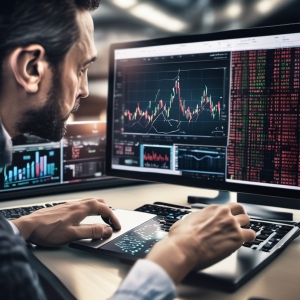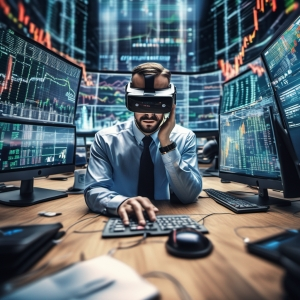Table of Contents:
Introduction to AI in Trading
As technology continues to evolve, the world of trading is not left out. It is experiencing massive changes, thanks to the implementation of Artificial Intelligence. AI in Trading has become a game-changer, profoundly affecting how market participants buy and sell securities. It's not just about speed and efficiency but also about leveraging machine intelligence to explore and seize profitable opportunities.
This technology has shown immense potential in automating financial tasks, resulting in higher accuracy and minimal human intervention. Among the most significant advancements is the use of robots for trading commonly known as algorithmic or automated trading. This practice is growing increasingly popular with both newbies and experts of financial markets.
This piece aims to demystify the idea of AI in trading by providing a comprehensive overview of the concept, its key benefits, challenges, and its impact on stock markets. Whether you are a new participant in the financial markets or a seasoned trader, this read will enhance your understanding of how AI is revolutionizing trading.
Understanding The Role of AI in Trading
Artificial intelligence is transforming the trading landscape by shifting the focus from manual to algorithmic trading. In its basics, AI involves the creation of comprehensive algorithmic trading strategies that are capable of making buying and selling decisions automatically, based on pre-set parameters. These algorithms analyze vast amounts of data within seconds, significantly reducing the time spent on research and analysis. They then use this data to predict market trends and execute trades at the most opportune time.
Moreover, some sophisticated AI trading tools utilize machine learning, a subset of AI that makes the algorithms self-learning. Instead of strictly following a pre-determined set of rules, these algorithms learn from the data they analyze, thus improving their decision-making capabilities over time.
Additionally, AI promotes high-frequency trading, which depends on the speed of executing trades. In these scenarios, AI's lightning-fast decision making gives traders an edge over their competitors. This competitive edge has made AI a must-have tool in the investment arena, impacting various aspects of trading from market prediction to risk management.
Pros and Cons of Using AI in Trading
| Pros | Cons |
|---|---|
| Speed and Efficiency: AI can process and analyze large volumes of data much faster than humans which is vital in trading where every second counts. | High Costs: AI systems can be expensive to develop, implement and maintain. |
| Risk Management: Efficient use of AI can help in predicting market trends and managing investment risks. | Reliability: AI systems are still not foolproof and can make mistakes. |
| 24/7 Trading: AI systems can function round the clock providing continuous updates and executing trades even in the absence of human supervision. | Lack of Intuition: AI systems lack the human intuition or gut feeling that sometimes plays a crucial role in trading. |
| Data Processing: AI can handle more variables and data points when evaluating stocks as compared to traditional methods. | Job Displacement: Increased use of AI in trading could lead to job losses in the sector. |
| Reduction in Errors: AI systems can significantly reduce the potential for human error. | Over-reliance: Over-reliance on AI systems could have severe consequences in case of any malfunction or error in the system. |
How AI is Transforming The Trading Process

The trading process, traditionally ruled by human judgment and intuition, has experienced an innovative uplift with the incorporation of AI. One way AI is shifting the trading dynamic is by facilitating predictive analysis. AI tools, armed with historical data, are capable of processing and analyzing previous market trends to make informed projections on future market movements. This predictive capacity allows for smarter trading decisions, minimizing potential losses that could result from volatile market conditions.
Further, AI also bridges the gap in data analysis. Trading often involves dealing with vast amounts of data, from stock prices to financial news, that is complex and time-consuming to analyze manually. However, AI tools expedite this process as they can consume and deliver insights from these data sets at an unprecedented rate, allowing for quick, timely trading decisions.
Lastly, AI plays a significant role in risk management. Driven by machine learning, these trading tools learn from each trade they make, refining their performances over time. Consequently, they become better at recognizing trade risks and implementing risk mitigation strategies. Thus, traders can leverage AI to manage potential market risks better and secure their investments.
Benefits of AI in Trading
The integration of AI into the trading world brings a number of distinct advantages. Let's explore some of these perks.
First, AI allows for 24/7 Trading. Unlike traditional markets that are time-constrained, AI grants traders the ability to trade any time. This advantage enables participation in different markets across time zones without fear of missing out on lucrative trade opportunities.
Secondly, AI guarantees the application of impartial judgment. Trading decisions are based solely on data analysis, eliminating emotion-induced decisions that could lead to poor results.
Thirdly, AI brings about scalability. As markets broaden and trading becomes increasingly intricate, AI algorithms handle the increased data and complexity seamlessly. This adaptability and flexibility in handling significant data sets give traders the best chance of success.
Lastly, AI's role in customization cannot be ignored. Traders can adjust AI algorithms to fit their trading preferences, risk tolerance, and investment goals. This personalized approach caters to individual trading styles, offering a better possibility of positive results.
Challenges in Implementing AI in Trading

While AI holds great promise in revolutionizing the trading landscape, implementation is not without challenges. One of the primary concerns is the high cost of AI tools and infrastructure. Setting up and maintaining an AI-based trading system requires significant investment, making it challenging for small-scale traders to adopt this advanced technology.
Another hurdle is the complexity associated with AI systems. Developing and fine-tuning an AI model to ensure reliable performance requires a degree of expertise not all market participants possess. Additionally, the algorithms used in AI systems are often black boxes, with decision-making processes that are difficult to interpret or debug.
Thirdly, the risk of over-reliance on AI systems can pose a serious threat. While AI can process large amounts of data at high speed, it is not free from technical glitches or inaccuracies. Sole reliance on automated decisions without human supervision or control could lead to detrimental trading decisions.
Finally, the ethical aspect cannot be ignored, even with AI in trading. There's the potential for misuse of AI technology, such as in preferential high-frequency trading, where a select few can leverage speed for their benefit at the expense of others in the trade.
Real-world Examples of AI in Trading
Let's now delve into some real-life instances showcasing the application and successes of AI in the trading world.
1. Quantitative Funds: Also known as Quant Funds, these are investment funds driven by AI algorithms. They select, buy and sell assets based on mathematical models. One notable example is the Medallion Fund by Renaissance Technologies. Since its inception, the fund, renowned for its heavy reliance on AI, has been posting high returns year after year.
2. Robo-advisors: One of the most popular applications of AI in trading is the use of robo-advisors. These are automated platforms that provide investment management services based on algorithms. They consider a client's financial goals and risk tolerance to develop an optimal portfolio. Companies such as "Betterment" and "Wealthfront" are widely used robo-advisors that effectively illustrate the abilities of AI in portfolio management.
3. High-Frequency Trading Firms: These firms use AI algorithms to execute large volumes of trade orders at lightning speeds. By doing so, these firms capitalize on small price differences that may occur in the fraction of a second. Citadel Securities and Two Sigma are amongst the prominent players in high-frequency trading.
4. Trading Assistants: AI-powered trading assistants like "E*TRADE" or "FidelityGo" provide retail investors with personalized trading recommendations. They analyze market trends, financial news, and social media sentiments to generate investment insights, demonstrating AI's prowess in decision-making support.
These real-world applications highlight the mounting presence and achievements of AI in various facets of trading, reinforcing its role as a crucial tool in modern-day financial markets.
Future Scope of AI in Trading

While AI has already made significant strides in the world of trading, the path forward promises even more fascinating developments. The future of AI in trading looks predominantly positive as strides are made in enabling more efficient and effective trading processes.
One expected trend is the expansion of AI-based financial advisory services, often known as robo-advisors. These automated platforms will provide more personalized financial advice based on individual's financial goals and risk appetite, further democratizing the investment space. This development, combined with increased AI transparency and explainability, will attract more users to AI-based trading systems.
Additionally, with the evolution of AI, the integration of deep learning – a complex form of machine learning that emulates the human brain's neural networks – into trading may be witnessed. Deep learning models are expected to significantly boost predictive accuracy, refine risk management strategies, and enhance the overall trading process.
Lorem ipsum dolor sit amet, consectetur adipiscing elit, sed do eiusmod tempor incididunt ut labore et dolore magna aliqua. Ut enim ad minim veniam, quis nostrud exercitation ullamco laboris nisi ut aliquip ex ea commodo consequat.
On another note, as the application of AI keeps growing, concerns about trading system security will grow in tandem. Consequently, advancements in AI focused on mitigating cybersecurity threats will become more crucial. Appreciably, the advent of AI-powered cybersecurity solutions will provide robust protection against potential cyber threats targeting trading platforms.
The use of AI in trading may offer transformative potential, but its full scope in the future will largely depend on ongoing research, technological developments, and the evolving demands of the trading world.
Sure, here you go:
Conclusion: AI's Revolution of Trading
The integration of Artificial Intelligence into trading is indeed a revolutionary leap forward. It has undeniably transformed the trading landscape by introducing efficiency, accuracy and speed that human traders could only dream of. Enhanced decision-making, risk management proficiency, and the ability to scale indefinitely are clear indicators of AI's positive impact in trading.
While the use of AI in trading does bring its share of challenges, such as the need for robust regulations to prevent market manipulations, the benefits it offers are hard to overlook. Going forward, we can expect to see even more advances and innovations in this direction. AI in Trading is no longer a fringe concept; it is quickly becoming the norm in our increasingly digitized global financial markets.
Therefore, as traders and investors, it is essential to embrace this technological shift and leverage its potentials. It is not only about streamlining operations but also about gaining a competitive edge in the ever-evolving financial trading ground.
In conclusion, AI in trading is not just a fad; it's a disruptive technology reshaping the world of trading. As it continues to evolve, the promise is that of a more efficient, accurate, and profitable trading environment.
FAQs: AI in Trading: How Technology is Revolutionizing the Stock Market
What is the Role of AI in Trading?
AI improves trading strategies by analyzing large amounts of data quickly and accurately. It's used for high-frequency trading, algorithmic trading, and predicting market trends.
How Does AI Enhance the Accuracy of Market Predictions?
AI uses machine learning algorithms to analyze market trends and historical data to predict future prices with greater accuracy than traditional methods.
What is Algorithmic Trading in AI?
Algorithmic trading is the use of complex AI systems to make trading decisions at speeds far greater than any human is capable of, often based on a set of pre-determined instructions.
How Does AI Minimize Trading Risk?
AI can minimize trading risk by analyzing past market data and predicting future market situations. AI algorithms can also monitor, in real-time, several risk factors impacting investment portfolios.
Can AI Completely Replace Human Traders?
While AI can process and analyze data more quickly than a human, it lacks intuition and flexibility. Therefore, the best practice is a combination of AI technology and human judgement.












